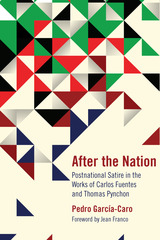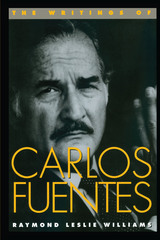
After the Nation proposes a series of groundbreaking new approaches to novels, essays, and short stories by Carlos Fuentes and Thomas Pynchon within the framework of a hemispheric American studies. García-Caro offers a pioneering comparativist approach to the contemporary American and Mexican literary canons and their underlying nationalist encodement through the study of a wide range of texts by Pynchon and Fuentes which question and historicize in different ways the processes of national definition and myth-making deployed in the drawing of literary borders. After the Nation looks at these literary narratives as postnational satires that aim to unravel and denounce the combined hegemonic processes of modernity and nationalism while they start to contemplate the ensuing postnational constellations. These are texts that playfully challenge the temporal and spatial designs of national themes while they point to and debase “holy” borders, international borders as well as the internal lines where narratives of nation are embodied and consecrated.

Carlos Fuentes is a master of modern world literature. With the translation of his major works into English and other languages, his reputation has surpassed the boundaries of his native Mexico and of Hispanic literature and has become international. Now each new novel stimulates popular and scholarly reviews in periodicals from Mexico City and Buenos Aires to Paris and New York.
Carlos Fuentes: A Critical View is the first full-scale examination in English of this major writer's work. The range and diversity of this critical view are remarkable and reflect similar characteristics in the creative work of Carlos Fuentes, a man of formidable intellectual energy and curiosity.
The whole of Fuentes' work is encompassed by Luis Leal as he explores history and myth in the writer's narrative. Insightful new views of single works are provided by other well-known scholars, such as Roberto González Echevarría, writing on Fuentes' extraordinary Terra Nostra, and Margaret Sayers Peden, exploring Distant Relations, for which she served as authorized translator. Here too are fresh approaches to Fuentes' other novels, among them Where the Air Is Clear, Aura, and The Hydra Head, as well as an examination by John Brushwood of the writer's short fiction and a look by Merlin Forster at Fuentes the playwright. Lanin Gyurko reaches outside Fuentes' canon for his fascinating study of the influence of Orson Welles' Citizen Kane on The Death of Artemio Cruz. Manuel Durán and George Wing consider Fuentes in his role as critic of both literature and art.
Carlos Fuentes: A Critical View has been prepared with the writer's many English-speaking readers in mind. Quotations are most frequently from standard, readily available English translations of Fuentes' works. A valuable chronology of the writer's life rounds off the volume.

Smitten by the modernity of Cervantes and Borges at an early age, Carlos Fuentes has written extensively on the cultures of the Americas and elsewhere. His work includes over a dozen novels, among them The Death of Artemio Cruz, Christopher Unborn, The Old Gringo, and Terra Nostra, several volumes of short stories, numerous essays on literary, cultural, and political topics, and some theater.
In this book, Raymond Leslie Williams traces the themes of history, culture, and identity in Fuentes' work, particularly in his complex, major novel Terra Nostra. He opens with a biography of Fuentes that links his works to his intellectual life. The heart of the study is Williams' extensive reading of the novel Terra Nostra, in which Fuentes explores the presence of Spanish culture and history in Latin America. Williams concludes with a look at how Fuentes' other fiction relates to Terra Nostra, including Fuentes' own division of his work into fourteen cycles that he calls "La Edad del Tiempo," and with an interview in which Fuentes discusses his concept of this cyclical division.
READERS
Browse our collection.
PUBLISHERS
See BiblioVault's publisher services.
STUDENT SERVICES
Files for college accessibility offices.
UChicago Accessibility Resources
home | accessibility | search | about | contact us
BiblioVault ® 2001 - 2024
The University of Chicago Press









